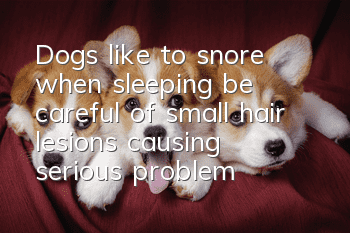Dogs like to snore when sleeping, be careful of small hair lesions causing serious problems

Does your dog like to snore? The reason why dogs snore is actually the same as the reason why humans snore. It is because the respiratory tract is blocked when sleeping, causing difficulty in breathing. This situation often occurs in dogs with short muzzles. In dogs, long-term snoring may cause chronic hypoxia and affect their health.
Although it is normal for a dog to snore, you should also pay attention to the volume and frequency of the dog’s snoring to determine whether it is normal behavior:
1. When a dog snores very loudly, please be careful whether the dog has asthma problems. This means that the air is blocked when entering the nasal cavity or throat. It may also be that the trachea in the neck has collapsed.
2. Normal snoring should be a low-frequency volume. It is the sound produced by gas vibration when air passes through membrane tissue or liquid. Most of this is possible because the dog's throat is relatively narrow. A snoring sound occurs.
3. In addition to the above two factors, a dog's poor sleeping posture will also cause snoring. As long as the owner gently and timely helps it adjust its sleeping posture, the snoring situation can be improved.
If obvious snoring sounds still occur after adjusting the posture, the owner should determine whether he needs to be sent to the doctor for examination
To determine whether a dog’s snoring is normal or not, owners can observe the dog’s barking while it is still awake. When a dog's barking changes (for example, it becomes hoarse or smaller than before), it may be due to partial obstruction of the respiratory tract. This situation is usually accompanied by the dog's breathing becoming louder, and you can clearly hear the dog exhaling. At this time, the dog should be taken to the animal hospital for treatment.
With more alertness, you can take more care of your dog’s health~
Generally, dogs that are under 1 year old and suffer from congenital laryngeal paralysis are more likely to have respiratory problems. Owners of the following dog breeds need to be particularly careful:
1. Congenital laryngeal paralysis: Flanders Shepherd Dog, Siberian Husky, Dalmatian.
2. Habitual laryngeal paralysis: usually occurs in medium and large dogs, such as St. Bernard, Labrador, and golden retrievers, mostly in male dogs.
It is a kind of romantic happiness to let the dog accompany the owner in good health~
- Have you ever fed all the fruits that dogs can’t eat?
- What to do if Schnauzer has yellow hair on his mouth
- What causes dogs to bite their tails?
- How long do dogs sleep at night?
- How long does it take for a dog to shed its hair?
- Dosage of montmorillonite powder for dogs
- Dog poop has white bugs
- What to do if the dog refuses to obey?
- Why is the dog panting rapidly?
- Can dogs eat five-nut mooncakes?



